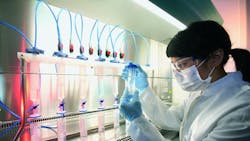New York has reached an agreement with one of the largest real estate developers in biotechnology to build more Manhattan laboratory space, in a bid to catch up with smaller cities attracting life-sciences companies.
Mayor Bill de Blasio’s administration and Alexandria Real Estate Equities Inc. agreed to expand a life-science campus in the midtown Manhattan neighborhood of Kips Bay, according to the New York City Economic Development Corp. Alexandria will break ground on a 550,000-square-foot tower in 2020, the third building on the campus that caters to the drug industry and other researchers.
Governments around the world are courting fast-growing biotechnology and pharmaceutical companies, which offer higher-than-average salaries. That includes New York, whose life-science ecosystem is smaller than those of Boston and San Francisco despite having many of the same resources as those cities: research hospitals, top-tier universities, and access to capital. In part, that can be attributed to the lack of lab space in New York.
Over the past decade, the city has worked to change that, first under former Mayor Michael Bloomberg, and now de Blasio. The first building on the Alexandria campus in Kips Bay opened in 2010 and a second opened in 2013. The site now counts Bristol-Myers Squibb Co., Eli Lilly & Co. and biotechnology company Cellectis SA among its tenants. In 2016, de Blasio announced a $500 million initiative to spur growth of the industry.
Alexandria has built a $13 billion empire by developing lab space for biotechnology companies in research hubs around the U.S. In an interview last month, founder and Chairman Joel Marcus called New York “one of our crown jewels” and said that the city’s life-science industry was still in the first decade of a 25-year-long development period. In July, Alexandria bought a building that makes up Pfizer Inc.’s headquarters on East 42nd Street after the pharmaceutical giant said it would move to Hudson Yards.
A surge in initial public offerings and private investment into biotech startups this year has sent real estate prices in Cambridge, Massachusetts, the industry’s largest cluster, soaring. Lab space in Kendall Square now rents for more than average prices in midtown Manhattan. Alexandria, which says it’s the largest operating landlord in the area after the Massachusetts Institute of Technology, has been one of the biggest beneficiaries of the boom.
New York officials want to keep companies whose research is spun out of its universities and research hospitals in the city, rather than losing talent to places where lab space may be more readily available.
“I don’t want to read in the paper that scientists who trained at Columbia or NYU are taking their show on the road and going up to Cambridge,” said Alicia Glen, New York City Deputy Mayor for Housing and Economic Development, in a telephone interview. “New York City is the epicenter of so many different sectors and we need to be very conscious of the fact that we need to diversify our economy.”
The city, which owns the underlying land, has been in negotiations with Alexandria over how to best develop the site. Glen said that while the exact tenant mix is yet to be determined, she expects that the building will include incubator space where biotech companies in early stages will be able to conduct lab work.
By Rebecca Spalding
About the Author
Bloomberg
Licensed content from Bloomberg, copyright 2016.
